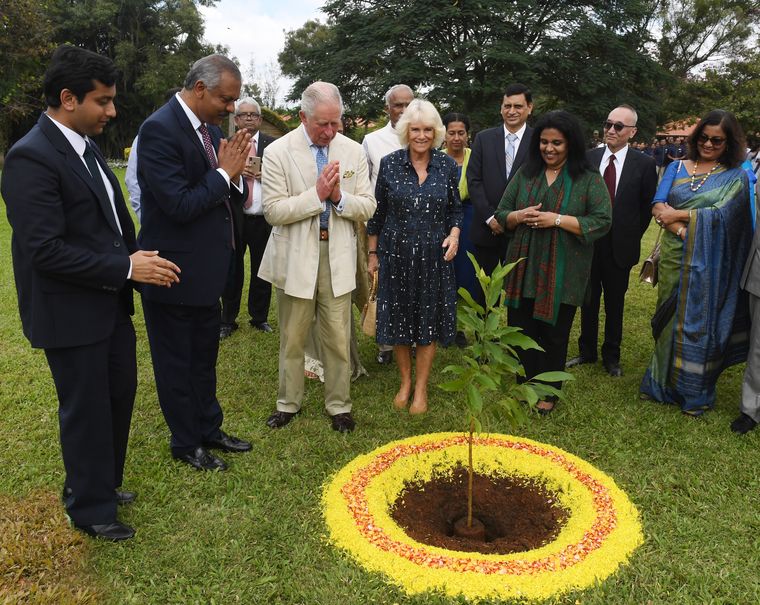When Prince Charles planted a champaca sapling in the Soukya Foundation complex in Bengaluru on November 16, it was not just for posterity; it was for the present generations, too. The tree planting made a profound statement about sensible living and about the prince’s commitment to it.
The commitment was manifest also at a private meeting I had with the prince at Soukya, when he steered the conversation towards the need for business leaders to join hands for sustainable development. The prince shared his concern over pollution affecting human lives and strongly advocated sustainability. “What you eat, drink and breathe are connected to sustaining life on this planet,” he said.
A few days earlier, the prince had experienced first-hand the poor air quality in the national capital, where the authorities had declared a public health emergency. The last time he was in Delhi, high levels of pollution had kept him from visiting a school there. This time again, he had to skip his scheduled visit to the school as it was shut down after a pollution alert.
Flying into Bengaluru after a brief stopover in Mumbai, the prince felt that south India was so much different in many respects. All the same, he emphasised that pollution was a global concern and hoped that people, especially the local communities, would work together to tide over the crisis.
A staunch environmentalist, Prince Charles said that sustainable development was the way forward and that it was certainly economically viable, too. The British Asian Trust, a diaspora-led organisation for South Asia founded by the prince in 2007, is focused on tackling poverty and inequality, and is now keen on collaborating with business leaders in south India to take up sustainability initiatives.
He strongly advocated afforestation, indigenous rainwater harvesting methods, renewable energy and organic farming. While many sustainability initiatives have taken off in north India, the prince said, the models should be made to work in south India, too. Pitching for renewable energy, the prince said he was taking a lot of interest in it. However, he said, local support was crucial for the transformation.
At a time when India’s ancient systems of medicine like ayurveda, homoeopathy, naturopathy and therapeutic yoga are growing in popularity globally, an endorsement for holistic medicine has come from the prince and his wife, Camilla, the Duchess of Cornwall. The prince had his first experience of the rejuvenation therapy at Soukya International Holistic Health Centre. “It was wonderful,” he said.
Before arriving in Bengaluru for the rejuvenation therapy, the prince, who turned 71 on November 14, had celebrated his birthday with schoolchildren at the Taj Mahal Palace hotel in Mumbai, where he attended a roundtable conference with Indian business leaders on sustainable market initiatives. In Delhi, he had called on President Ram Nath Kovind and visited the Bangla Sahib gurdwara and the meteorological department, thus combining diplomacy, religion and climate science in one brief visit.
At Soukya, a surprise awaited him: Dr Issac Mathai, medical director of Soukya, and his wife, Suja Issac, who is Soukya’s cofounder and executive director, had organised a special prayer meeting at the Holy Trinity chapel in the complex. Celebrating the occasion, the prince cut a special vanilla cake with chocolate icing, with a “farm” theme reflecting his passion for organic farming.
Dr Mathai said the prince’s three-day stay at Soukya helped him appreciate the fact that holistic systems were both effective and practical. Holistic medicine now fits into the prince’s passion for environment and sustainability as he believes that they help sustain human life on this planet.
While it was the prince’s first visit to Soukya, the duchess has been a regular visitor at the holistic centre. “I have been here six times,” she said. “I am glad that he could experience Soukya for the first time and we enjoyed it.” The royal couple’s patronage of holistic healing had become evident in April last year, when an AYUSH centre was set up at Saint Charles Hospital, London. It was jointly inaugurated by Prime Minister Narendra Modi and the Prince of Wales.
Amid our conversation on the uniqueness of Kerala cuisine and Kerala as a pioneer state in sustainability initiatives, I could not but remind him of his parents’ visit to Kochi in 1997. Queen Elizabeth II and her majesty’s husband, Prince Philip, the Duke of Edinburgh, had visited several parts of India on the 50th year of India’s independence. I told the prince that his father had then formally inaugurated the internet editions of THE WEEK and the Malayala Manorama newspaper and had delivered a delightful speech at our office in Kochi. “Is that so,” the prince responded with self-effacing grace.
Camilla mentioned that she enjoyed Kerala cuisine. The prince said, “I have been to Kerala earlier, but I need to explore it better.” Most Keralites, I guess, would welcome him with open arms.


